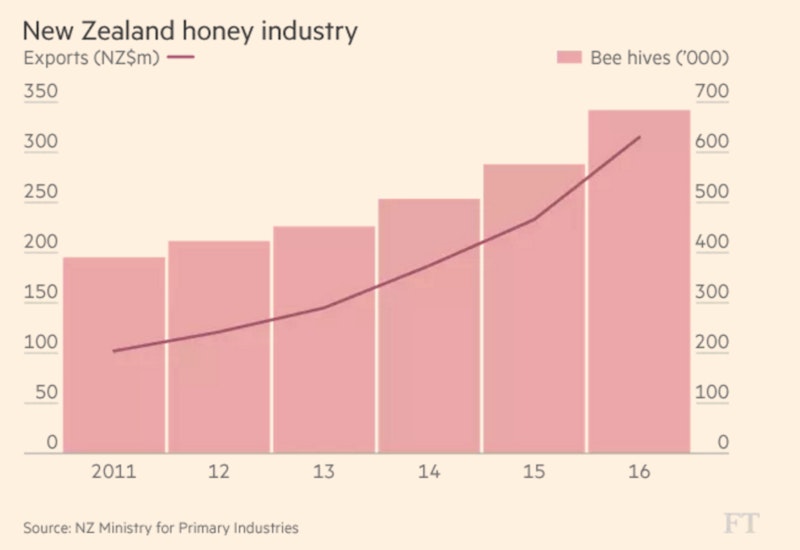In the News
Honey trap
22nd May 2017
Any Dragons Den devotee will know that one of the first issues for a new product with a great USP is "Can you protect the idea?". This is THE big question for bee-keepers in New Zealand, producing Manuka honey. This graph shows why:

Honey has been valued for centuries, not only as a sweetener and great addition to toast, but also for its medicinal properties as it helps wounds to heal, providing a barrier against infection. Manuka honey, made by bees feeding on the manuka plant which grows only in New Zealand and small area of Australia, has a particularly high concentration of active ingredients, including methylglyoxal, which has anti-bacterial properties. It has become a super-food: The Times reported that Kourtney Kardashian swears by it, Scarlett Johansson loves its “amazing glow” and Gwyneth Paltrow used to pour it in her smoothies.Think of the impact on demand - a massive increase in consumer preference for a product which can only come from a limited supply of manuka flowers means that the price rockets, and jars of Manuka honey sell at up to £45 a pot. Exports to the UK, China and other countries are expected to reach NZ$400m in the next few years, and hives are very valuable to the producers - leading to over 500 thefts of hives (hive heists) in the last ten months.
And this causes the problem - how do you know for sure that the honey you are buying at such a premium price is genuinely Manuka? An investigation by Grocer magazine in 2015 claimed more honey labelled manuka was being sold in the UK alone than was actually produced in New Zealand. An investigation by The Times earlier this year found that jars labelled as Manuka honey by health food store Holland and Barrett, Amazon, and even Fortnum and Mason, the Queen's grocers in London, were fake.
Until now there has been no accurate scientific test to authenticate manuka honey, leaving the industry exposed to abuse. However, New Zealand’s ministry of primary industries (MPI) has recognised the need to regulate the product.Bryan Wilson, deputy director-general of MPI says that“It is important that overseas regulators have confidence in the assurances we give them about New Zealand manuka honey, and that consumers in those countries are confident they are getting the real deal. If not, our access to markets could be put at risk or we may lose the premium price which our bee products command overseas.”
So after three years of testing honey samples, the MPI has released a scientific definition to be used to authenticate manuka honey destined for export. The new definition will only apply to honey that is produced in New Zealand. Exporters will require a valid test result to show that their product meets MPI’s scientific definition for manuka honey. “We support the government test, which will have a great deal of credibility,” says John Rawcliffe, head of the Unique Manuka Factor Honey Association in New Zealand.
The FT reports that the association believes the new standard definition and tests should help it win trademark protection for the name manuka in key overseas markets. Such a move would prevent honey producers from other countries, including Australia, using the manuka name in their branding. “Manuka is a Maori word. It is every bit as unique to New Zealand as the All Blacks,” says Mr Rawcliffe.
However, manuka plants are also native to parts of Australia. “We will be objecting to their certification plan,” said Trevor Weatherhead, director of the Australian Honey Bee Industry Council. “Manuka grows here and there is some evidence to suggest it is an aboriginal word." Watch out for Honey Wars to come!
You might also like
Protecting a Startup's Business Idea
Teaching PowerPoints
Chivalrous Thieves take a Chinese coach tour to the Strong Man Street Party
18th February 2015

Exchange Rates, Costs and Competitiveness - Making the Link
10th March 2015
Methods of Entering International Markets
Topic Videos

Protecting a Brand | Lidl Management Will Be Hopping Mad at This
29th September 2022
